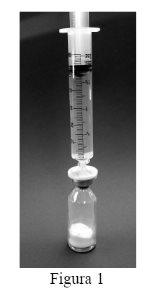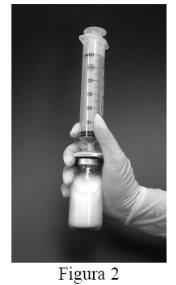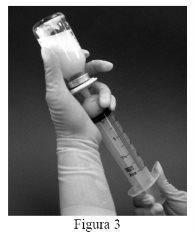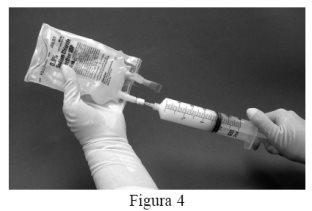
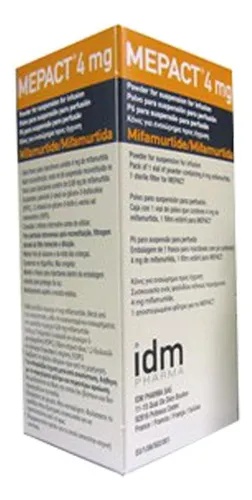
MEPACT 4 mg PÓ PARA SUSPENSÃO PERFUSÃO

Pergunte a um médico sobre a prescrição de MEPACT 4 mg PÓ PARA SUSPENSÃO PERFUSÃO

Como usar MEPACT 4 mg PÓ PARA SUSPENSÃO PERFUSÃO
Introdução
Prospecto: informação para o utilizador
MEPACT 4 mg pó para concentrado para dispersão para perfusão.
mifamurtida
Leia todo o prospecto detenidamente antes de começar a usar o medicamento, porque contém informações importantes para si.
- Conserva este prospecto, porque pode ter que voltar a lê-lo.
- Se tiver alguma dúvida, consulte o seu médico.
- Se experimentar efeitos adversos, consulte o seu médico, mesmo que se trate de efeitos adversos que não aparecem neste prospecto. Ver secção 4.
Conteúdo do prospecto
- O que é MEPACT e para que é utilizado
- O que precisa saber antes de começar a usar MEPACT
- Como usar MEPACT
- Possíveis efeitos adversos
- Conservação de MEPACT
- Conteúdo do envase e informações adicionais
1. O que é MEPACT e para que é utilizado
MEPACT contém o princípio ativo mifamurtida, semelhante a um componente da parede celular de algumas bactérias. Estimula o sistema imunológico para ajudar o seu organismo a destruir as células tumorais.
MEPACT é utilizado para o tratamento do osteossarcoma (câncer de ossos) em crianças, adolescentes e adultos jovens (entre 2 e 30 anos). É utilizado após ter sido submetido a cirurgia para eliminar o tumor e tratado com quimioterapia para destruir as células cancerosas que possam permanecer e reduzir assim o risco de recaída do câncer.
2. O que precisa saber antes de começar a usar MEPACT
Não use MEPACT:
- se é alérgico (hipersensível) à mifamurtida ou a qualquer um dos outros componentes deste medicamento (incluídos na secção 6).
- se está utilizando medicamentos que contenham ciclosporinas ou outros inibidores de calcineurina ou altas doses de anti-inflamatórios não esteroideos (AINEs) (ver mais abaixo “Uso de outros medicamentos”).
Advertências e precauções
Consulte o seu médico antes de começar a usar MEPACT:
- se tem ou teve problemas de coração ou dos vasos sanguíneos, como coágulos de sangue (trombose), sangramento (hemorragia) ou inflamação das veias (vasculite). Durante o tratamento de MEPACT, será submetido a uma vigilância estreita. Se os seus sintomas não desaparecem com o tempo ou pioram, deve contactar o seu médico, porque pode ser necessário retardar ou suspender o tratamento com MEPACT.
- se tem antecedentes de asma ou outros distúrbios respiratórios. Antes de usar MEPACT, consulte o seu médico sobre se deve continuar a usar os medicamentos para a asma enquanto utiliza
MEPACT.
- se tem antecedentes de doença inflamatória ou autoimune ou foi tratado com corticosteroides ou outros medicamentos que podem afetar o seu sistema imunológico.
- Se tem alguma reação alérgica a medicamentos, incluindo erupção, falta de ar, e pressão sanguínea alta. Se padece um agravamento dos sintomas, deve contactar o seu médico, porque estes podem ter sido causados por MEPACT.
- Se tem problemas de estômago, como náuseas, vómitos e perda de apetite. Se os seus problemas aumentam, deve contactar o seu médico, porque estes podem ter sido causados por MEPACT quando usado com a quimioterapia.
- Se desenvolve calafrios ou tremores, ou sente calor. Deve tomar a temperatura, porque pode ter febre. A presença de febre com um recuento baixo de glóbulos brancos (neutropenia) pode ser um sinal de infecção grave.
Na secção 4, inclui-se informação detalhada sobre as advertências e precauções relacionadas com os efeitos adversos que podem ocorrer enquanto estiver a tomar este medicamento.
Crianças
Não administre este medicamento a crianças menores de 2 anos, porque não se dispõe de informação sobre a sua segurança e eficácia neste grupo etário.
Outros medicamentos e MEPACT
Informa o seu médico se está utilizando, utilizou recentemente ou pode ter que utilizar qualquer outro medicamento, mesmo os adquiridos sem receita. É muito importante que informe o seu médico se está utilizando medicamentos que contenham alguma das seguintes substâncias:
- ciclosporina, tacrolimus, utilizados após um transplante para evitar o rejeição dos órgãos transplantados, e outros imunossupressores utilizados, por exemplo, para tratar a psoríase (uma doença cutânea).
- medicamentos anti-inflamatórios não esteroideos (AINE), como ácido acetilsalicílico, ibuprofeno ou diclofenaco, utilizados para o tratamento de dores de cabeça, febre ou dor. Não use MEPACT se está utilizando anti-inflamatórios não esteroideos em altas doses (AINE).
- corticosteroides, para o tratamento de inflamações, alergias ou asma. Deve evitar o uso regular de corticoides quando estiver utilizando MEPACT, porque este pode afetar a forma como os medicamentos atuam.
Recomenda-se separar os horários de administração de MEPACT e doxorrubicina ou outros medicamentos, se forem combinados no mesmo regime quimioterápico.
Gravidez, lactação e fertilidade
Se está grávida ou em período de lactação, acredita que possa estar grávida ou tem intenção de engravidar, consulte o seu médico antes de utilizar este medicamento.
MEPACT não foi testado em mulheres grávidas. Por isso, MEPACT não deve ser utilizado durante a gravidez, nem em mulheres em idade fértil que não utilizem um método anticonceptivo eficaz. Utilize um método anticonceptivo eficaz se receber tratamento com MEPACT.
Não se sabe se MEPACT passa para o leite materno. Se está a amamentar o seu filho, consulte o seu médico.
Condução e uso de máquinas
Alguns efeitos adversos muito frequentes ou frequentes do tratamento com MEPACT (como tontura, vertigem, fadiga e visão borrosa) podem afetar a capacidade para conduzir e utilizar máquinas.
MEPACT contém sódio
Este medicamento contém menos de 23 mg de sódio (1 mmol) por unidade de dose; isto é, é essencialmente “isento de sódio”.
3. Como usar MEPACT
Dose e duração do tratamento
MEPACT será administrado apenas sob a supervisão de um médico especialista. Siga exatamente as instruções de administração deste medicamento indicadas pelo seu médico. Em caso de dúvida, consulte novamente o seu médico.
A dose recomendada de MEPACT é de 2 mg/m2 de superfície corporal. Será administrado duas vezes por semana (com pelo menos três dias de diferença) durante as primeiras 12 semanas, e depois uma vez por semana durante outras 24 semanas.
O programa de tratamentos pode ser ajustado para que se encaixe no seu programa de quimioterapia. Não é necessário que interrompa o programa de MEPACT se o seu tratamento de quimioterapia for retardado; terá que completar 36 semanas (9 meses) de tratamento com MEPACT sem interrupções
Como é administrado MEPACT
O pó liofilizado tem que ser reconstituído em uma suspensão líquida, filtrado usando o filtro que se fornece e posteriormente diluído antes do uso. A perfusão de MEPACT é feita diretamente em uma veia (por via intravenosa) durante cerca de 1 hora. Isso será realizado pelo seu médico ou uma enfermeira, que também o controlará durante esse tempo. Não é necessário que seja hospitalizado para receber MEPACT. Também pode ser administrado a pacientes ambulatoriais.
Se usar mais MEPACT do que o deveria
Pode experimentar mais efeitos adversos graves, como febre, calafrios, fadiga, náuseas, vómitos, cefaleia, tensão arterial alta ou tensão arterial baixa. Em caso de sobredose, contacte o seu médico ou dirija-se ao hospital mais próximo.
Se interromper o tratamento com MEPACT
Não deve interromper o tratamento com MEPACT antes de terminar o programa de tratamento sem consultar previamente o seu médico. Se tiver alguma outra dúvida sobre o uso deste produto, pergunte ao seu médico.
4. Possíveis efeitos adversos
Como todos os medicamentos, MEPACT pode produzir efeitos adversos, embora nem todas as pessoas os sofram.
A maioria dos pacientes experimentou calafrios, febre e fadiga, especialmente durante a primeira administração de MEPACT. Estes efeitos são normalmente leves a moderados e transitórios e podem ser tratados pelo seu médico; por exemplo, com paracetamol para a febre. Quando é utilizado com quimioterapia, o tratamento com MEPACT pode causar problemas de estômago, tais como náuseas, vómitos e perda de apetite.
Consulte o seu médico imediatamente:
- se persistem a febre ou os calafrios mais de 8 horas após receber a dose de MEPACT, porque pode ser indicativo de uma infecção, ou
- se experimenta erupção ou apresenta outros problemas respiratórios (sibilância) ou
- se experimenta qualquer problema de estômago.
Efeitos adversos muito frequentes(podem afetar mais de 1 de cada 10 pessoas):
- febre, calafrios/tremores, fraqueza, cansaço ou mal-estar geral
- náuseas e/ou vómitos, diarreia ou constipação
- cefaleia ou tontura
- batimentos rápidos do coração (taquicardia)
- pressão arterial alta ou baixa
- falta de apetite
- sudorese
- dor, que pode ser dor geral, dor muscular e/ou articular e dor de costas, peito, abdômen, braços ou pernas
- tosse, problemas para respirar ou jadeação
- baixa temperatura corporal
- baixo recuento de eritrócitos
Efeitos adversos frequentes(podem afetar até 1 de cada 10 pessoas):
- coloração azul dos tecidos, como a pele ou as gengivas, devido à falta de oxigênio
- aumento apreciável da frequência ou da força dos batimentos do coração
- edema nos braços ou pernas, ou em outros locais
- desconforto no peito
- desconforto de estômago, perda de apetite ou perda de peso
- reação local no local da injeção ou do catéter.
- eritema ou vermelhidão, inflamação da pele, coceira, secura, palidez ou vermelhidão transitória
- inflamação da pele, tendões, músculos ou tecidos semelhantes que apoiam a estrutura corporal
- inflamação de uma veia
- dor abdominal na parte superior ou na parede torácica; distensão ou dor abdominal; dispepsia ou dor no fígado
- outro tipo de dor, também no pescoço, ombro, virilha, ossos ou garganta; dor pós-operatória
- espasmo ou rigidez muscular
- sensação de frio
- fadiga, tontura ou sonolência
- queimadura, sensação de coceira ou formigamento, sensibilidade reduzida às sensações ou sensação de sensibilidade sem estímulos
- movimentos de sacudida involuntários
- desidratação
- baixa concentração de potássio no sangue
- inflamação das mucosas
- congestão ou inflamação do nariz, garganta ou seios
- infecções do trato respiratório superior (como um resfriado) ou do trato urinário (como uma infecção da bexiga)
- infecção generalizada
- infecção por Herpes simplex (vírus)
- tosse produtiva, sibilância ou dificuldade respiratória por esforço ou exacerbada
- corrimento nasal ou hemorragia nasal
- líquido na cavidade pulmonar
- sangue na urina, dificuldade ou dor ao urinar ou micção frequente
- dificuldade para dormir, depressão, ansiedade ou confusão
- tontura
- zumbido de ouvidos
- visão borrosa
- queda de cabelo
- menstruação difícil, dolorosa
- perda de audição
- número baixo de glóbulos brancos com ou sem febre, número baixo de plaquetas
Frequência não conhecida(não pode ser estimada a partir dos dados disponíveis:
- acúmulo excessivo de líquido ao redor do coração (derrame pericárdico)
Comunicação de efeitos adversos
Se experimentar qualquer tipo de efeito adverso, consulte o seu médico, mesmo que se trate de possíveis efeitos adversos que não aparecem neste prospecto. Também pode comunicá-los diretamente através do sistema nacional de notificação incluído no Apêndice V.
Ao comunicar efeitos adversos, você pode contribuir para fornecer mais informações sobre a segurança deste medicamento.
5. Conservação de MEPACT
Mantenha este medicamento fora da vista e do alcance das crianças.
Não utilize este medicamento após a data de validade que aparece no envase após “EXP”.
A data de validade é o último dia do mês que se indica.
Frasco não aberto:
Conservar em refrigerador (entre 2°C e 8°C). Não congelar.
Conservar o frasco no embalagem exterior para protegê-lo da luz.
Suspensão reconstituída:
Uma vez reconstituída com uma solução de cloreto de sódio 9 mg/ml (0,9%), conservar a temperatura ambiente (aproximadamente 20°C - 25°C) e utilizar em um prazo máximo de 6 horas. Não utilize este medicamento se observar indícios visíveis de deterioração.
Os medicamentos não devem ser jogados nos deságues nem na lixeira. Dessa forma, você ajudará a proteger o meio ambiente.
6. Conteúdo do envase e informação adicional
O que contém o MEPACT
- O princípio ativo é a mifamurtida. Cada frasco contém 4 mg de mifamurtida. Após a reconstituição, cada ml contém 0,08 mg de mifamurtida.
- Os outros componentes são palmitoil-2-oleoil-sn-glicero-3-fosfocolina (POPC) e
1,2-dioleoil-sn-glicero-3-fosfo-L-serina sal monossódica (OOPS). Ver seção 2 “MEPACT contém sódio”.
Aspecto do MEPACT e conteúdo do envase
MEPACT é um pó ou massa de cor branca a esbranquiçada para concentrado para dispersão para perfusão.
MEPACT é apresentado em uma caixa de cartão que contém:
- Um frasco de 50 ml com um tampão de borracha butílica cinza, selo de alumínio e lingueta de plástico.
- Um filtro estéril fornecido em um blister.
Título da autorização de comercialização:
Takeda France SAS
112 avenue Kléber
75116 Paris
França
Responsável pela fabricação:
Takeda Austria GmbH
St. Peter-Straße 25
A-4020 Linz
Áustria
Delpharm Novara S.r.l.
Via Crosa, 86
28065 Cerano (NO)
Itália
Data da última revisão deste prospecto:
Outras fontes de informação
A informação detalhada deste medicamento está disponível no site da Agência Europeia de Medicamentos: http://www.ema.europa.eu.
-------------------------------------------------------------------------------------------------------------------------
---
A seguinte informação está dirigida exclusivamente aos profissionais de saúde:
Instruções para a preparação do MEPACT para perfusão intravenosa
Materiais fornecidos em cada caixa -
- 1 frasco de MEPACT (mifamurtida)
- 1 filtro para MEPACT
Materiais necessários, mas não fornecidos -
- Solução injetável de cloreto de sódio de 9 mg/ml (0,9%), bolsa de 100 ml
- Seringa estéril de 60 ou 100 ml para uso único com conector luer
- 2 agulhas para injeção estéril de calibre médio (18)
Recomenda-se que a reconstituição da suspensão lipossomal seja realizada em uma cabine de fluxo laminar utilizando luvas estéril e técnicas assépticas.
Deve-se deixar que o pó liofilizado atinja uma temperatura de aproximadamente 20ºC – 25ºC antes de sua reconstituição, filtragem mediante o filtro fornecido e diluição. Isso leva cerca de 30 minutos.
- Retire o lacre do frasco e limpe o tampão utilizando um algodão embebido em álcool.
- Retire o filtro do blister e retire a tampa do filtro com agulha.
Introduza seguidamente a agulha no frasco, perfurando com firmeza a tampa até que fique bem segura. Neste momento, não deve retirar a tampa do conector luer do filtro.
- Desembale a bolsa com 100 ml de solução injetável de cloreto de sódio de 9 mg/ml (0,9%), a agulha e a seringa (não fornecidas na caixa).
- Limpe com um algodão embebido em álcool o local da bolsa de solução injetável de cloreto de sódio de 9 mg/ml (0,9%) onde se vai inserir a agulha.
- Utilizando a agulha e a seringa, retire da bolsa 50 ml de solução injetável de cloreto de sódio de 9 mg/ml (0,9%).
- Depois de retirar a agulha da seringa, esta deve ser acoplada ao filtro abrindo a tampa do conector luer do filtro (figura 1).
|
- Ajunte ao frasco a solução injetável de cloreto de sódio de 9 mg/ml (0,9%) mediante uma pressão lenta, mas firme, do êmbolo da seringa. Não deve retirar o filtro nem a seringa do frasco.
- Deve deixar o frasco repousar durante 1 minuto para assegurar uma hidratação profunda da substância seca.
- Em seguida, agite com força o frasco durante 1 minuto enquanto mantém acoplados o filtro e a seringa.Durante este tempo, os lipossomos se formam espontaneamente (figura 2).
|
- Pode retirar a dose necessária do frasco invertendo-o e retirando lentamente o êmbolo da seringa (figura 3). Após a reconstituição, cada ml de suspensão contém 0,08 mg de mifamurtida. O volume de suspensão que deve ser retirado de acordo com a dose é calculado da seguinte forma:
Volume que deve ser retirado = [12,5 x dose calculada (mg)] ml
Para maior facilidade, é fornecida a seguinte tabela de concordância:
Dose | Volume |
1,0 mg | 12,5 ml |
2,0 mg | 25 ml |
3,0 mg | 37,5 ml |
4,0 mg | 50 ml |
|
- Retire seguidamente a seringa do filtro e coloque uma nova agulha na seringa que contém a suspensão. Limpe o local de injeção da bolsa com um algodão embebido em álcool e injete a suspensão da seringa na bolsa original que contém os restantes 50 ml de solução injetável de cloreto de sódio de 9 mg/ml (0,9%) (figura 4).
|
- Dê várias voltas na bolsa suavemente para misturar a solução.
- Ajunte à etiqueta da bolsa que contém a suspensão lipossomal reconstituída e diluída a identificação do paciente, a hora e a data.
- Foi demonstrada a estabilidade química e física durante o uso durante 6 horas a temperatura ambiente (aproximadamente entre 20ºC – 25ºC).
- Do ponto de vista microbiológico, o produto deve ser utilizado imediatamente. Se não for utilizado imediatamente, os tempos e condições de conservação do produto após a abertura são responsabilidade do usuário e normalmente não devem ultrapassar as 6 horas a temperatura ambiente.
Nenhum requisito especial para sua eliminação.
- País de registo
- Substância ativa
- Requer receita médicaSim
- Fabricante
- Esta informação é apenas para referência e não constitui aconselhamento médico. Consulte sempre um médico antes de tomar qualquer medicamento. A Oladoctor não se responsabiliza por decisões médicas baseadas neste conteúdo.
- Alternativas a MEPACT 4 mg PÓ PARA SUSPENSÃO PERFUSÃOForma farmacêutica: INJETÁVEL, DesconhecidaSubstância ativa: tasonerminFabricante: Belpharma S.A.Requer receita médicaForma farmacêutica: INJETÁVEL, 0,5 mg de cloridrato de histamina/0,5 mLSubstância ativa: histamine dihydrochlorideFabricante: Laboratoires DelbertRequer receita médicaForma farmacêutica: INJETÁVEL, 20 mg de acetato de glatiramero / mlSubstância ativa: glatiramer acetateFabricante: Teva GmbhRequer receita médica
Alternativas a MEPACT 4 mg PÓ PARA SUSPENSÃO PERFUSÃO noutros países
As melhores alternativas com o mesmo princípio ativo e efeito terapêutico.
Alternativa a MEPACT 4 mg PÓ PARA SUSPENSÃO PERFUSÃO em Polónia
Alternativa a MEPACT 4 mg PÓ PARA SUSPENSÃO PERFUSÃO em Ukraine
Médicos online para MEPACT 4 mg PÓ PARA SUSPENSÃO PERFUSÃO
Avaliação de posologia, efeitos secundários, interações, contraindicações e renovação da receita de MEPACT 4 mg PÓ PARA SUSPENSÃO PERFUSÃO – sujeita a avaliação médica e regras locais.




